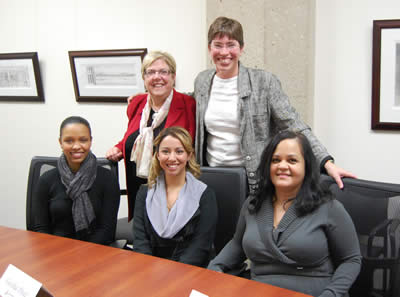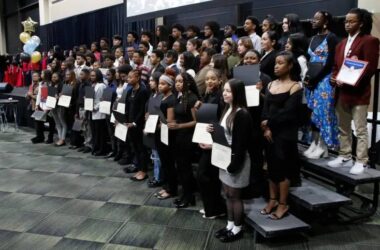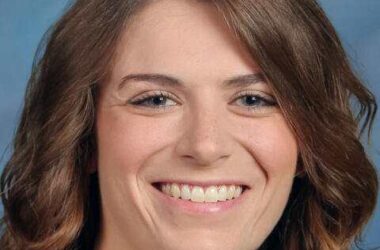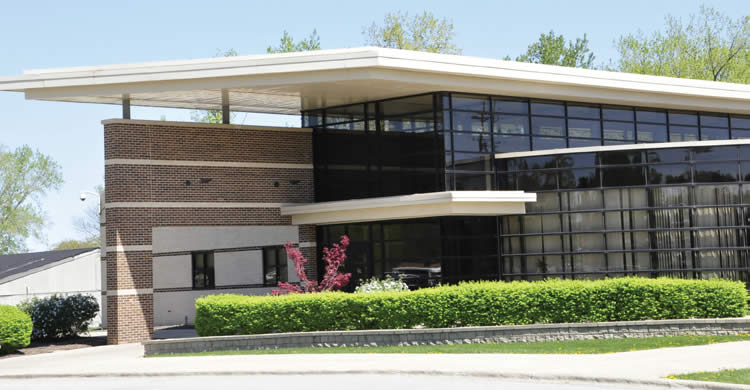
Lt. Governor Sheila Simon and GSU President Elaine P. Maimon with Dual Degree Program students (from left) Kayla Randolph-Clark, of Manhattan; Cecilia Diaz, of Chicago Ridge; and April Grammer, of Flossmoor. (PHOTO SUPPLIED)
University Park, IL-(ENEWSPF)- Affordability, retention, and college completion – all key components of Governors State University’s commitment to students – took the spotlight Tuesday during Lt. Governor Sheila Simon’s visit to the university.
During her two-and-a-half hour visit, Simon met with GSU students, faculty, staff, and administrators. She called on federal, state and higher education officials to work together to keep college affordable so thousands of Illinois students can earn the credentials needed for good-paying jobs.
“In order to retain and attract high-wage and high-skills jobs in Illinois, we will need 60 percent of our working-age population to hold college credentials by 2025,” Simon said. “We cannot expect students to complete college if they cannot afford college. I urge our state, federal and higher education leaders to work together to ensure college is not only accessible to the privileged, when it will be a prerequisite for a good job in our state.”
President Elaine P. Maimon thanked Simon for her efforts to make college education affordable and accessible in Illinois. Simon is considered Governor Pat Quinn’s point person on education reform.
“I admire Lt. Governor Simon’s commitment to making a college education affordable and accessible,” Dr. Maimon said. “Her visit to GSU gave us an opportunity to showcase what we are doing, specifically the Dual Degree Program and our plans for first-year students. The lieutenant governor is passionate about student success, and we are, too.”
Simon is visiting all 12 public universities in Illinois this fall to hold College Affordability Summits with students, faculty and administrators. Simon has outlined three ways stakeholders can work together to make college affordable – consumer protections, targeted assistance, and tax credits for tuition payments.
According to a College Board trends report published last month, costs at public and private universities nationwide increased more than 4 percent this school year, while the cost of community college increased more than 5 percent since last school year. Compounding the burden, federal student aid declined for the first time in three years.
GSU officials pointed out that Governors State has the most affordable tuition of any public university in Illinois. The Dual Degree Program, a national model for college completion, offers a proven path to seamless, successful transfer from community college to university. GSU has long been a leader in working with non-traditional students to help them achieve their education goals.
Dr. Maimon said she supports Lt. Governor Simon’s initiatives to encourage more students to graduate with high quality degrees and cited the GSU Promise program as an example of working towards accomplishing that goal.
“We have established an endowment to support the GSU Promise, offering low-income students in the Dual Degree Program the opportunity to complete both the associate and bachelor’s degrees debt-free,” Dr. Maimon said.
Founded in 1969, Governors State University provides educational opportunities to more than 7,000 city and suburban students and is recognized as having the most affordable tuition in the state of Illinois. GSU is the only regional public university south of the Chicago city limits and north of Bloomington-Normal. In partnership with regional community colleges, GSU has developed the Dual Degree Program, which is supported by the Kresge Foundation and recognized nationally as a high quality, seamless pathway from community college to university graduation. In August, 2014, GSU will admit its first freshman class with 270 full-time, day-time students benefiting from decades of research on what constitutes a successful first-year experience. Also in 2014, the university will open its first apartment-style student residences, accommodating students at every level of instruction, from freshman to doctoral, in the family atmosphere of living/learning communities.








